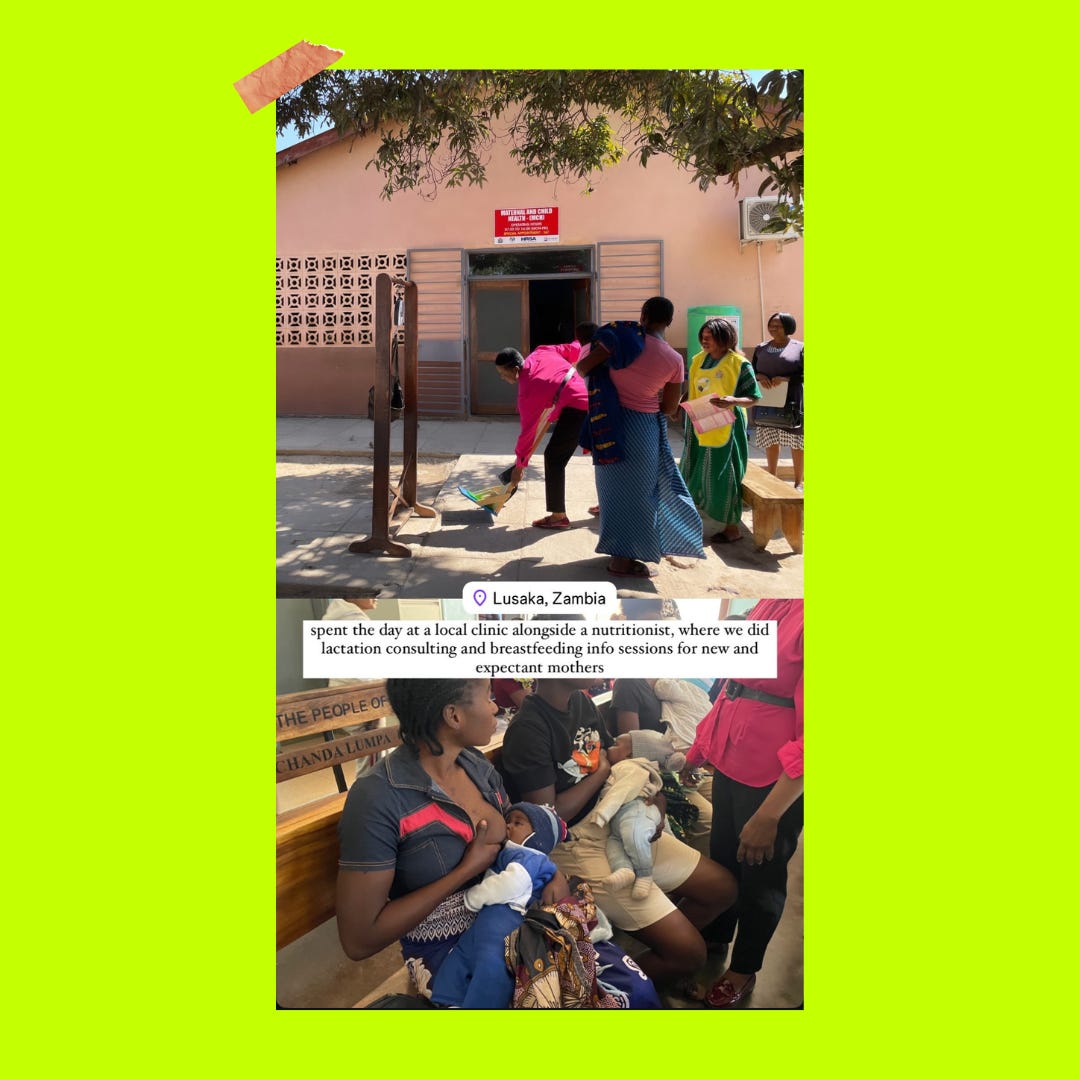Laid Off: Communications Specialist at USAID
"DOGE started a full-on witch hunt for staff members who worked on DEIA initiatives to give them the boot."
Laid Off is the coolest place on the internet to talk about being laid off. Wanna collab? Sponsor this thing? Have a juicy tip? Hit reply.
In today’s issue, I talk to former USAID communications specialist Kossana Young on what it’s like for your agency to be abruptly dismantled by the Trump administration.
Kossana Young, 28, was working in the office of maternal and child health at USAID when she saw a news report that a global health senior staff member was escorted out of the building by police.
That’s when she started feeling anxious, and things only escalated from there.
On Friday, January 24th, Kossana was instructed to edit the entire maternal and child health website to remove any language around DEI (diversity, equity, and inclusion). She said they couldn’t say “equitable health” or even “diverse nutrition.”
By Monday, January 27th, her colleagues (other institutional support contractors in global health) around the agency started to get furloughed, with notice that their jobs would resume following the freeze and review of programs. That didn’t happen. Later that night, the layoff emails started coming in.
Kossana received her own at 2am on January 29th. She had worked there for three years. She was one of the thousands of workers laid off from USAID, effectively eradicating the agency’s entire work force. An agency providing health and humanitarian assistance around the world.
“Imagine dedicated healthcare workers supported by USAID programs, providing lifesaving care in clinics worldwide,” she said. “Then, overnight, those clinics can no longer distribute HIV medication, guide a worried mother through breastfeeding challenges, offer nutrition education or aid, provide mosquito nets to protect families, administer childhood immunizations, deliver oxygen to struggling newborns, or even ensure safe childbirth with essential medical supplies. One day, these skilled professionals — empowered by USAID’s training, resources, and support — are saving lives. The next, it’s all gone.”
What reasoning did they give for laying you off?
They actually did not give us a reason for the layoff at first. It started with the inauguration — Trump signed numerous executive orders including a return to work order and the DEIA (Diversity, Equity, Inclusion, and Accessibility) removal order. Both affected my work, as I am remote in North Carolina and all of my communications work was centered on ending preventable deaths for women and children through equitable care. Once the executive orders were in place, we began to speculate a stop work order would come so the new administration could review our programs and contracts, and remove all language around DEIA. Shortly after, there was an executive order put in place to freeze US foreign aid. At this time, we were speculating the freeze was in place to review programs and contracts for DEIA language. We got no communications from our contractors during this time.
How did they handle layoffs?
Horribly. We got laid off with no notice or inkling that it would happen, in the middle of the night, two days before our health insurance ends, with two days to use our FSA benefits, only 24 hours to return our equipment, no severance pay, and we were locked out of both our PHI (Public Health Institute) and USAID systems within less than 24 hours so people were unable to download pay stubs, performance evals, their years of work, W2's, submit final timesheets, etc.
In the layoff email, PHI, my contractor, had the audacity to ask us to take an Exit Interview Survey within three days of receiving the email which was a complete smack in the face, because they didn't have the courtesy to give us an advanced notice, or to even hold a meeting to give us the space to ask questions or to provide us with more context and details, but asked us to help strengthen their process? Our jobs vanished in the middle of the night, and we had no way to contact our employer with questions. Everything went black. We sent emails that got no response, we tried calling and got no answers. Hundreds of employees were left confused, heartbroken and scared. It was January 29th, bills were due February 1st, and we suddenly had no source of income and no jobs, after spending years being loyal to this company and USAID.
Where were you when you found out?
I was in bed. The layoff emails started coming to colleagues on my contract mid-day January 28th. I anxiously waited for my email until 2am, January 29th. Each hour that passed I held out hope that my email would be different. I kept thinking that maybe they would keep me since I work in communications, so I sat, anxiously refreshing my email and crying, for hours.
Who was the first person you told after getting laid off?
I began telling people the Friday before I got laid off that I thought it was coming. We were getting some pretty aggressive emails from the new administration, and people were getting furloughed and laid off left and right. DOGE started a full-on witch hunt for staff members who worked on DEIA initiatives to give them the boot. They requested that we out DEIA staff members to a special DEAI truth email address within 10 days, and if we didn't, they would take action. We also started getting emails about how we must "support Trumps agenda and the American people who voted for an American first agenda". It all seemed very intense. Out of fear and confusion, I started telling my family members, father, and close friends about what was going on. Then, I received a stop work order, which I texted to my best friend and sisters. Shortly after the stop work order, a colleague that worked in the office informed us that officers came into the building and began taking our pictures off the walls.
What was the first thing you did after receiving the news?
I cried. Not just for myself, but for those who worked for USAID for years and years. Lifelong careers vanished over night. I was more sad that the global work ended, at how we were treated, and for those with much longer careers, than I was for myself. I was devastated at the thought of all the missions around the world stopping such important and needed work.
You mentioned in your layoff post that USAID gave you a platform to contribute to life-changing efforts. Can you share some of those?
USAID worked to serve other people, to save lives, and to provide lifesaving interventions to those in need. I worked on preventing maternal and child deaths, and our work ranged across maternal, newborn, and child health, nutrition, immunization, and water, sanitation and hygiene. But it didn't end there — we worked collaboratively with HIV support, neglected tropical diseases, family planning, etc. We worked in 40+ countries to help children and mothers survive, and to end preventable deaths. I personally got to travel to Zambia last May where I supported a neonatal health summit with the goal of preventing newborn deaths in Zambia. I got to visit health clinics and see the amazing PEPFAR, nutrition, and maternal and newborn health initiatives USAID projects and programs were implementing to help save lives. Beyond that, even though I only worked in communications, I got to see firsthand how our missions and technical staff members were making a change and increasing the statistics of women and children surviving. Here is a story I published about breastfeeding saving lives and fighting newborn malnutrition in Zambia.
You also noted that while this is an emotional and personal setback, the broader impact on the communities you serve is even more heartbreaking. Can you elaborate for those that might not be familiarized with the consequences of defunding USAID?
Here are my top three highlights on how defunding USAID will impact the global communities served: 1. Humanitarian Crises will Intensify: we provided emergency aid during disasters, conflicts, and famines. Defunding and stopping humanitarian programs will worsen suffering in crisis zones. Example: sending aid to those in Gaza or Ukraine, or sending aid to Morocco after their devastating earthquake. 2. Increased Poverty and Health Decline: USAID funds programs for food security, maternal health, infectious disease control, HIV, etc. Defunding will lead to more malnutrition, maternal deaths, and disease outbreaks. 3. Weakened Global Health Security: USAID plays a crucial role in combating pandemics and supporting disease surveillance. Cutting funds will increase the spread of diseases globally, including to the U.S.
The USAID layoffs made headlines a few times before they were announced internally. What was that like, to learn about your layoffs in the news?
It was extremely challenging. I learned through Devex that layoffs were happening. I remember getting a text from one of my friends who is currently in Africa working with the state department. She said, "Girl what is happening to USAID?" and I was like, what is she talking about? This was on January 22nd. It's funny looking back at this and seeing how naïve I was! I truly believed the Trump administration was just reviewing our programs, because internally that's what we were being told, meanwhile the news was telling us that was not the case. I found out five days later that I should have probably believed the news a bit more.
On a similar note, Elon Musk was reported saying that he'd "spent the weekend feeding USAID into the wood chipper." How did reading that affect you?
Ironically, I took a screenshot of his tweet that said "USAID is a criminal organization. Time for it to die." and texted it to my best friend, saying "My. Blood. Is. Boiling." I never saw him say he spent the weekend feeding USAID into the wood chipper. That too makes my blood boil. It makes me angry that he doesn't realize that into the wood chipper went thousands of American employees. How are they "making America great" by laying off thousands of Americans? Or perhaps he does realize it, and he doesn't care, which is even more angering.
It is scary and dark for those still at USAID. Just a few days ago employees received an email from "HR" (aka DOGE) asking them to reply with approximately five bullets of what they accomplished last week, cc'ing their manager.
Have you been talking to your USAID peers who were also laid off? What's been the common theme among those conversations?
Yes, quickly after reports of layoffs began coming out in the news, group chats were made, and we've been in constant contact and supporting one another. Common themes of frustration, anger, sadness, and confusion appeared in our conversations. It's been about a month and layoffs are still happening. USAID is getting smaller and smaller. The website it gone. The building lost its signage. At that point, common theme's are helping one another to move forward — whether that be via organizing protests, answering questions on submitting unemployment, reviewing resumes, job hunting together, some colleagues are even opening their homes for others. I'm glad to have this sense of community because this experience is truly traumatizing.
Kossana is actively seeking opportunities in communications, digital strategy, and knowledge management. You can reach her on LinkedIn.
Paid subscribers get access to:
The Laid Off Discord 💬
Laid Off Trend Reports 📈
The Pen Pals program 📫
This is a reader-supported publication made possible by the generosity of paid subscribers. I appreciate you.













All layoff stories are difficult. This one, in particular, really hit me hard. Usually, a layoff only affects one person, but with the destruction of USAID, people around the world are impacted. Thank you for sharing this important story Melanie. And all my best to Kossana and everyone at USAID.
Thanks for all that you do Kossana! I’m sorry that such an important role (and entire office) was eliminated. My blood boils, too.